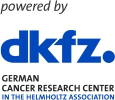Speaker
Description
High-risk human papillomaviruses (HPVs) are involved in cervical and oropharyngeal cancers, causing over 730 000 new cases and 350 000 deaths worldwide every year. The viral oncoproteins E6 and E7, essential for induction and maintenance of the malignant phenotype, are ideal therapy targets. Proteolysis Targeting Chimeras (PROTACs) are small molecules triggering proteasomal degradation of target proteins, and additionally enhancing MHC-presentation of target protein-derived peptides on the cell surface. The aim of this project is to investigate whether PROTAC-mediated HPV E6/E7 degradation potentiates the efficacy of HPV therapeutic vaccination, by increasing viral antigen presentation on target cells. First, we will characterize HPV16 E6/E7-derived peptides presented on MHC-I after PROTAC-mediated degradation. Therefore, we have developed a highly sensitive mass spectrometry-based immunopeptidomics pipeline to identify HPV-derived peptide candidates, by optimizing the detection of very low abundant and cysteine/methionine-enriched peptides. Because creating PROTACs for new target proteins is challenging, we used the dTAG system consisting of the overexpression of HPV16 E6 and/or E7 fused to the FKBP12F36V tag followed by a treatment with a ligand dTAG. The dTAG molecule binds to the FKBP12F36V tag and recruits an E3 ligase, leading to the degradation of FKBP12F36V -tagged HPV16 E6 and E7. Preliminary data showed that the dTAG system enables the detection of MHC-presentation of the E711-19 peptide, a promising peptide candidate for HPV therapeutic vaccination, demonstrating its suitability for gathering the proof-of-concept of our combined therapeutic approach. Peptides only presented or presented in an increased amount after dTAG-mediated degradation will be considered for immunogenicity assessment. Since not every peptide displayed on a cell surface is immunogenic, tumor immunogenicity will be tested for each identified peptide using a live cell microscopy-based cytotoxicity assay. Altogether, the results will demonstrate whether dTAG-mediated HPV16 E6/E7 degradation increases HPV-related tumor immunogenicity and towards which HPV16 E6/E7 epitopes this happens.
| Research type | Translational research |
|---|

